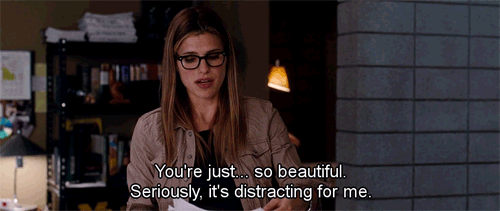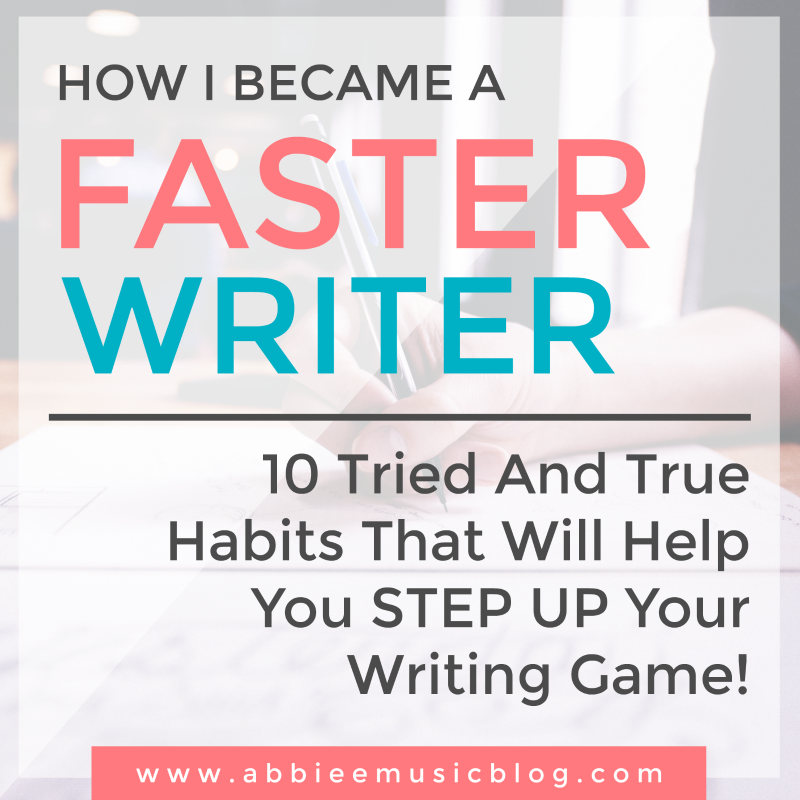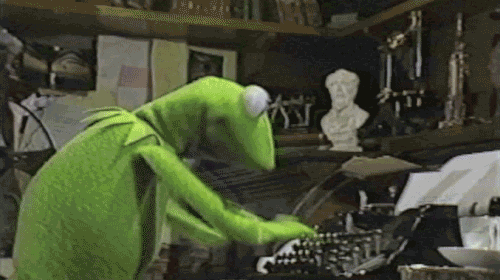I’ve always been a slow writer. I’ve always looked up to other writers who can crank out 20,000 words in a day and been amazed (and a little jealous) of their ability to write so fast. Many times, I’ve tried to write a crazy amount of words in one day – and many times, I have failed. And then I feel discouraged and inadequate. Is it simply impossible to be a faster writer?
The answer is: NO. It’s totally possible to become a faster writer, and it’s amazing what a few tiny changes can do for your creative output. There is nothing wrong with being a slow writer. But in the face of trials and tribulations*, it can be helpful to know that you have what it takes to write LOTS OF WORDS in a short amount of time.
I still wouldn’t consider myself a fast writer, but I’m definitely faster than I once was, even a few months ago. I’ve seen huge positive changes in my writing abilities since I started actively applying these changes to my process… and today I’m going to spill the secrets that will hopefully help you start writing faster, better, and more efficiently. Let’s go!
*NaNoWriMo
#1: SET A TIMER
You may have heard of a thing called “writing sprints.” You may have even TRIED them. YOU MAY EVEN LIKE THEM. If you had asked me about writing sprints one year ago, I probably would have grunted indignantly in reply. Because I tried writing sprints once and LET’S JUST SAY I DIDN’T LIKE THEM.* But last month, when I was rewriting a novel, I gave writing sprints another go. I opened up my interval timer app and set the clock to 25 minutes on and 5 minutes off. IT WAS A SUCCESS.
When you have no timer counting down beside you, it’s easy to drift off. It’s easy to stare out the window, glance at Pinterest, find a chocolate chip cookie recipe, wander away from your laptop and into the kitchen and START BAKING COOKIES, FOR GOODNESS SAKE. Basically, it’s easy to get distracted when you have no ticking clock.
That’s why writing sprints really help me. I start the timer and focus on my manuscript. For the next 25 minutes I just WRITE FULL SPEED AHEAD and I don’t look away from the screen. I say encouraging things to myself, like “Twenty-five minutes is nothing! You can do anything for twenty-five minutes!!” And pretty soon the buzzer rings, and my 5-minute break begins. THAT’S NOT A PINTEREST BREAK, EITHER, my friend. That’s a get off your butt and move around break. I walk away from my laptop, do some jumping jacks or stretches or practice kicks and punches,** then my timer rings again, indicating another 25-minute writing sprint and I SPRINT BACK TO MY LAPTOP AND KEEP WRITING.
I’m amazed by how well this method works for me and I highly recommend it. Sprinting isn’t about competition or being hard on yourself – it’s just about mental focus. When you are truly focused on your work, you’ll be astounded by how easily you can breeze through it. BUT HOW DO YOU GET FOCUSED IN THE FIRST PLACE? Let’s read on…
*I’m a super non-competitive person and doing sprints with other writers always feels too stressful to me. But I know that it’s not supposed to be a competition and I just have a hard time doing things with anyone other than myself lolololol *everyone leaves*
#2: ELIMINATE ALL DISTRACTIONS
TURN OFF THE WIFI. Seriously. It will help you. I promise. I know it’s hard, but…writing isn’t just SUNSHINE AND RAINBOWS HONEY BUNNY. It takes grit! It takes determination!! It takes one click to turn off that wifi!!! Sure, you can control yourself. But sometimes you forget to (aka: I forget to.) Opening up your internet browser and getting a NO CONNECTION error message will fish-slap you back into reality: you’re getting distracted! You can make chocolate chip cookies later, okay? And when you do, you can send some to me because I probably need them more than you do.
#3: NO RESEARCH ALLOWED
I can’t begin to tell you how many times I’ve been in the middle of writing and suddenly- “WAIT A MINUTE THERE’S MISSING INFORMATION HERE! I better Google this to make sure I know what I’m talking about…”
[THREE HOURS LATER]
[PRINTING OFF COOKIE RECIPE]
“Wow, I’m really getting distracted.”
This has been me an embarrassing amount of times and I’M SURE I’M NOT ALONE.* The problem with research is that it’s almost never quick. One Google search leads to another and pretty soon you’ve gone down a rabbit trail of no return. Sure, you might be learning cool stuff that you’ll be able to use in the future, but IT DOESN’T HAVE TO HAPPEN RIGHT NOW. I fight the urge to look things up all the time. It’s been a hard habit to keep, but instead of stopping to research, I write what I NEED to know in place of the missing information. Here’s an example, from the novel I rewrote in September:
Instead of bringing my writing to a screeching halt and Googling “temperatures in Illinois in October” I just wrote a reminder to myself to look it up later. Even the smallest bit of research can throw off your focus and YOU DON’T WANT THAT TO HAPPEN.
*that is, I HOPE I’m not alone?? Anyone else out there??? *screams “squirrel” into the void*
#4: DON’T FIND THE RIGHT WORD
Do you ever struggle to find the right words?? SAME. And it doesn’t just slow us down, it makes us STOP. And think. And stare at the ceiling. And groan miserably and rip our hair out and go to Thesaurus.com and BEFORE WE CAN EVEN SEARCH FOR THE WORD– clickbait attack!!!! “1920’s Slang We Should Bring Back!” “What’s the difference between Presume and Assume?” “12 Untranslatable Words We Should Have in the English Language!”
And just like that, your word count goal is flushed down the cosmic toilet of DIGRESSION. How can we avoid this terrible fate? By not finding the right word. YOU HEARD ME: stop trying to find the right word! Instead, write whatever it is you’re TRYING to say, even if it’s written in such a way that only you can understand. After all, you’re the one who is going to go back later and edit the manuscript and realize that “sharp thingy that you eat food with but you can also stab people with” is supposed to be “fork.” See? When you don’t spend any time ripping your hair out and you just KEEP GOING, you write a lot faster.
#5: MAKE YOUR SCHEDULE KNOWN
As writers, we all endure interruptions. Usually these interruptions come from family, roommates, or any other life form you happen to live with. They will interrupt you and ask you to do things for them (so annoying) and most of the time THEY HAVE NO IDEA YOU’RE WRITING. Or, even if they do know that you’re writing, they have no idea how important writing is to you.
That’s why you have to make your schedule known! For the past three months I’ve been obnoxiously persistent about reminding my family: “I’m doing NaNoWriMo in November! This is super important to me!” I’ve set aside time to help my family with whatever they may need from me, but I’m also being very open about how I’m going to be spending my time.
The point is: if you’re constantly being pulled away from your writing by other people, you’re not going to get much actual writing done. So kindly ask people to not disturb you. Or rudely ask them. Or threaten them at knife-point!! Whatever works, you know?
#6: DON’T STOP TO EDIT OR READ ANYTHING
This one is SO SO SO HARD FOR ME. Because few things in the world give me greater pleasure than READING MY OWN WRITING. When it’s not driving me crazy, my writing is actually pretty awesome! And clever! And funny! I enjoy reading it. Which means, as I’m writing, I very easily get distracted by scrolling up a few pages and reading everything I’ve written so far (OR EVEN WORSE: reading what I wrote yesterday!) To add insult to injury, I EVEN EDIT A LITTLE BIT. As I stop to smell the proverbial flowers of my own mad genius, I start making changes until finally I realize that WHAT DO YA KNOW? I’VE STOPPED WRITING. I’ve moved onto editing, and I shouldn’t even BE editing yet. The first draft need to be finished!!! IT’S LOCO. LET’S STOP GETTING IN OUR OWN WAY OF SUCCESS SHALL WE.
 |
| ^ ME @ MY OWN WRITING |
It’s a hard habit to break, but I am getting better. Now I try to only read the last few sentences I wrote in order to understand where I’m at in the scene. In fact, I sometimes tell myself that AFTER I reach my writing goal for the day, I can go back and read some of my book. Which gives me incentive to write even MORE WORDS so that I have more to read, later. INGENIOUS, RIGHT??
I know this sounds kind of counterintuitive. You would think that the more your internal coach screams, “WRITE FASTER!” the more your mind obeys. But it doesn’t. In fact, it activates the fight-or-flight response in your brain and causes Stress™, which leads to you seeking the nearest short-term comfort (i.e.: Netflix.) This is the reason why big, bold, and aggressive goals often burn us out and we give up on ourselves – because instead of taking things one step at a time, we psych ourselves too hard and crash fast. (This is why the Kaizen method works.)
So instead of telling yourself: “Write faster!” Try telling yourself: “Write the next sentence. And the next one. And the next one. Don’t quit.” It’s easy to look at your word count and panic because you’re nowhere NEAR the top of the mountain. But screaming: “I have to get to the top of the mountain!!” is only going to increase your chances of slipping and falling and splattering on the rocks below. Instead, look at the next step in front of you. Focus. Don’t quit.
#8: ESTABLISH A ROUTINE, NOT A REWARDS SYSTEM
I’VE GOT A PROBLEM WITH REWARDS SYSTEMS. Why? Because they don’t work for me. They make me feel like writing is not something to be enjoyed, but merely a job to muddle through so that I can enjoy the reward that comes AFTER I reach my daily word count goal. Rewards systems might work for you, and if so – AWESOME. I am by no means telling you how to live your life!* But I find that I enjoy writing much more (and end up writing better words) when I make writing part of my reward.
Even if you’re a professional full-time writer** you don’t have to treat writing like work. Instead of saying “I have to write,” say “I want to write,” OR EVEN BETTER: “I can’t wait to write.” I discovered HUGE IMPROVEMENT in my own writing when I started making writing part of my reward for accomplishing other goals. By establishing a routine (such as going for a quick walk, making a cup of tea, sitting down in a quiet place, and starting your timer) writing becomes more of an enjoyable event, rather than another task to complete. AND IF FOOD IS INVOLVED IT IS A MUCH MORE ENJOYABLE EVENT.
So instead of treating the writing process like work, try to treat it like FREAKING NETFLIX. If you enjoy the process of writing and you’re not just waiting for it to end, you’re more likely to write better words in less time.
*even though that’s LITERALLY ALL I DO AROUND HERE lol no shame
**CAN I BE YOU???? PLEASE???!!!
Sounds counterintuitive again, doesn’t it? But here’s the thing: when you push yourself to your limits and drain your creativity, you need to rest. Just like working your muscles, creative work is HARD WORK. Everyone has different limits – you have to listen to your gut. As an overachiever, this struggle is familiar: do more, do more, do more! It’s like the Murphey’s Law of pack mules like me – anything that CAN be added to my to-do list, WILL be added to my to-do list. But that’s actually harmful to your creativity. Just like with physical exercise, if you push too hard YOU’LL HURT YOURSELF.
Here’s a piece of advice I stole from my sagacious sister Kate: stop writing before you get tired of writing. She uses this method all the time when writing and says that it works really well – because if you write until you’re at a place of frustration and confusion, THEN you quit for the day…you might return tomorrow and still find yourself stuck in the same place. If you stop writing BEFORE you get frustrated and drained, you’ll return to your book EXCITED to write the next scene. Why? Because you didn’t let yourself write it yesterday. See all this creepy psychology happening here?? IT’S LIKE WE’RE FAKING OUT OUR OWN BRAINS MUAHAHAHA.
Every single writer is a different story.* Every writer has different limits. Don’t look at another writer’s word count and think, “I’m such a slow writer compared to them…” You’re not a slow writer. You’re a different writer. They have strengths and weaknesses – and so do you. The solution is self-acceptance. (WHICH I’M STILL WORKING ON, BTW. NOBODY IS PERFECT.)
This post has covered all the stumbling blocks that are probably keeping you from reaching your full potential in writing – but once you reach your potential, you have to accept whatever it is. I am a faster writer than I used to be, because I’ve put these habits into action; but I’m still not the fastest writer I know. AND I NEVER WILL BE. Because that’s just who I am. Not a very encouraging note to end on, but it has to be said: shoot for your best, but accept what your best ends up being. Someone else’s best is not your best. Why? BECAUSE YOU’RE DIFFERENT. Always look at your strengths, not your weaknesses.
*HAHA SEE WHAT I DID THERE SEE WHAT I DID THERE
Add to this list! What are some habits that help you to focus and write faster? Are you a slow-ish writer like me? Do you wish you could write faster? OR ARE YOU THE ENVY OF US ALL – the Fast Writer™? How is NaNoWriMo going for you?? Let’s talk about writing!!
rock on,
abbiee
















